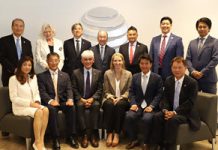The California Chamber of Commerce has urged the Office of the U.S. Trade Representative (USTR) to be committed to a quick and efficient renegotiation of any free trade agreement (FTA).
Besides being an integral part of a successful world economy, FTAs serve the interest of American producers, employees and consumers, the CalChamber emphasized in comments to the USTR.
The provisions of the FTAs and U.S. participation in the World Trade Organization (WTO) have been beneficial for U.S. industries, agricultural enterprises, farmers, ranchers, energy companies and automakers. Any renegotiation of U.S. FTAs must recognize the gains achieved and ensure that U.S. trade with its major trading partners remains strong and without interruption.
Trade Agreements
The United States has negotiated and completed FTAs with 20 countries. The CalChamber understands that our economy and businesses constantly are changing, and agrees with the premise that the United States should seek to grow our economy by improving U.S. opportunities under its FTAs.
The United States currently has FTAs with Israel; Mexico and Canada under the North American Free Trade Agreement (NAFTA); Jordan; Australia; Chile; Singapore; Costa Rica, Dominican Republic, El Salvador, Guatemala, Honduras and Nicaragua under the Dominican Republic-Central America FTA (DR-CAFTA); Bahrain; Morocco; Oman; Peru; Panama; Colombia; and South Korea.
The CalChamber comments to the USTR include statistics on how much trade with the 20 countries has increased since the FTAs went into effect.
Prosperity Tied to Trade
California is one of the 10 largest economies in the world with a gross state product exceeding $2 trillion. International trade and investment are major parts of our economic engine that broadly benefit businesses, communities, consumers and state government. California’s economy is diverse, and the state’s prosperity is tied to exports and imports of both goods and services by California-based companies, to exports and imports through California’s transportation gateways, and to movement of human and capital resources.
Although trade is a nationally determined policy issue, its impact on California is immense. In 2016, California exported to 228 foreign markets. Trade offers the opportunity to expand the role of California’s exports. In its broadest terms, trade can literally feed the world and raise the living standards of those around us.
The U.S. Department of Commerce reported that in 2016, California exports amounted to $163.6 billion, with California maintaining its perennial position as a top exporting state.
Exports from California accounted for 11% of total U.S. exports in 2016. California’s top export destinations are Mexico, Canada, China, Japan and Hong Kong. California trade and exports translate into high-paying jobs for more than 1 million Californians.
California is a top exporter in the nation of computers, electronic products, and sales of food and kindred products. Computers and electronic products are California’s top export, accounting for 26.1% of all the state’s exports.
CalChamber Position
The California Chamber supports expansion of international trade and investment, fair and equitable market access for California products abroad, and elimination of disincentives that impede the international competitiveness of California business.
The comments were submitted July 21 in response to a Federal Register notice about the Administration’s Review and Report to the President on Trade Agreements – Docket number USTR-2017-0010.
More information on the FTAs and WTO is available at www.calchamber.com/international.
Staff Contact: Susanne Stirling

